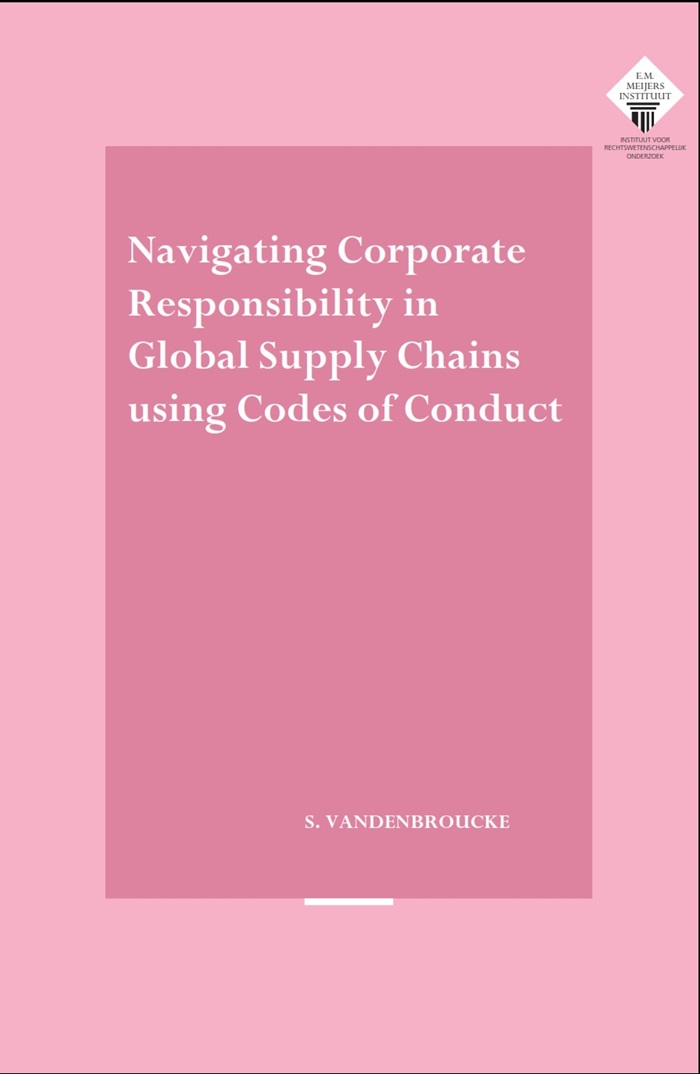
In today’s interconnected world, the clothes we wear and the gadgets we use are produced through global supply chains spanning multiple countries and actors. This system exposes deep social injustices, including forced labor, child exploitation, discrimination, and limited access to collective bargaining. Tragedies like the Rana Plaza disaster highlight the urgent need for fair and sustainable working conditions. In response, civil society and consumers increasingly pressure multinational corporations to adopt responsible business practices and integrate human rights protections into their operations. The role that multinationals must play in addressing labor issues beyond their corporate walls is at the heart of a contemporary debate, questioning the raison d’être of these powerful private actors and their broader societal obligations.
This dissertation, authored by Sarah Vandenbroucke, argues that multinationals have a social responsibility extending beyond their economic role. As major transnational actors with growing influence, they must contribute to preventing human rights violations wherever they operate. One way they attempt to do so is through codes of conduct – documents setting ethical labor standards throughout their supply chains. In their corporate social responsibility (CSR) policies, MNCs formally commit to social responsibility. But what do these codes really say, and do they lead to meaningful action?
This research examines SCCs as a form of ‘private regulation’ – a mechanism through which companies set labor standards in global supply chains without direct public oversight. While SCCs hold potential for improving labor conditions, their voluntary nature raises concerns about greenwashing: a disconnect between companies’ commitments and actual actions. This dissertation investigates whether SCCs serve as effective tools for labor rights protection or remain symbolic gestures. A mixed-methods approach, combining qualitative and quantitative research, is used to explore this question.
Following an introduction and a legal framework analysis, a systematic literature review assesses existing research on SCC effectiveness and identifies gaps. Vandenbroucke then performs a large-scale textual analysis of 880 codes of conduct, gathered in the Database of Business Ethics, to examine corporate commitments. Findings show that while most companies adopt SCCs and include core labor rights – such as the abolition of forced labor, child labor, and discrimination – these commitments rarely translate into concrete implementation strategies. Instead, responsibility for compliance is often shifted onto suppliers, with little evidence of companies taking active steps to enforce or monitor these standards.
Further analysis of corporate management systems reinforces this observation. There is a notable lack of effective tools and mechanisms within companies to ensure SCC implementation. To deepen this analysis, qualitative research based on interviews with human rights experts within MNCs is conducted. These interviews reveal two major obstacles: (1) a lack of appropriate tools within corporations to enforce their own codes, and (2) a general lack of awareness about SCCs and human rights obligations, not only among employees but also at the supplier level. This gap between commitments and real-world enforcement suggests that voluntary corporate initiatives alone are insufficient to ensure meaningful labor protections in global supply chains.
The dissertation concludes by emphasizing the need for a binding regulatory framework that holds corporations accountable for human rights compliance. The findings highlight a persistent gap between corporate discourse – the “talk” – and actual business practices – the “walk.”– Essentially, this thesis conveys the following message: the current global production system tainted by inequalities and labor exploitation calls for a transition – one that must also be pushed by the public actor, but where the private actor must hold an important role as the public/private divide is fading. In this transition, codes of conduct must become an integral part of corporate strategy, where the social mission of businesses is treated as a core objective rather than a peripheral concern.
Vandenbroucke defended her thesis on Februari 25th 2025 at the Law Faculty of Leiden University. Supervisors: Helen Pluut, Yvonne Erkens and Willem van Boom.
Sarah Vandenbroucke
Navigating corporate responsibility in global supply chains using codes of conduct
The dissertation is (partly) available at the repository of Leiden University.

